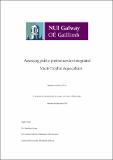| dc.contributor.advisor | Hynes, Stephen | |
| dc.contributor.author | van Osch, Suzanne | |
| dc.date.accessioned | 2020-05-11T08:24:20Z | |
| dc.date.available | 2020-05-11T08:24:20Z | |
| dc.date.issued | 2020-05-05 | |
| dc.identifier.uri | http://hdl.handle.net/10379/15957 | |
| dc.description.abstract | The global aquaculture industry demonstrates consistently high growth rates, yet growth of the European industry is lagging. The European Union expressed a dual approach to develop European aquaculture; aiming to increase production while addressing criticisms towards the environmental impact of aquaculture production. Integrated Multi-Trophic Aquaculture (IMTA) has been suggested by scholars and governmental actors as a production process that can reach this dual aim. However, industry uptake of IMTA has been slow and research on its economic implications is limited.
This thesis aimed to assess preferences of the European public for IMTA products. The principal research objective was to estimate consumer’s Willingness to Pay (WTP) for IMTA products compared to monoculture products. Additionally, the effects of preference and scale heterogeneity on WTP estimates were assessed by contrasting methods of addressing heterogeneity in CE discrete choice analysis. The analysis utilised data from a survey containing a Choice Experiment (CE) which included an ecolabel to assist respondents in their CE decision making. This ecolabel has been assessed as a tool to stimulate more informed purchasing decisions by the European public.
The results demonstrate a positive WTP for the sustainability attribute across the models and sample countries as well as for the pooled data set. Estimating WTP using contrasting methods of addressing heterogeneity demonstrated that including scale heterogeneity affects WTP estimates, but to a lesser degree as accounting for preference heterogeneity. An ecolabel informing the consumer of the degree of environmental impact of the product was received positively by the public.
This research contributes to seafood preference studies by adding to multinational research on public preferences for IMTA products that is lacking for the European territory. A comparison of models addressing heterogeneity types added to the dearth of research on seafood preferences taking into account scale heterogeneity. | en_IE |
| dc.publisher | NUI Galway | |
| dc.rights | Attribution-NonCommercial-NoDerivs 3.0 Ireland | |
| dc.rights.uri | https://creativecommons.org/licenses/by-nc-nd/3.0/ie/ | |
| dc.subject | IMTA | en_IE |
| dc.subject | Choice experiments | en_IE |
| dc.subject | WTP | en_IE |
| dc.subject | Aquaculture | en_IE |
| dc.subject | Consumer preferences | en_IE |
| dc.subject | Random Parameter Logit | en_IE |
| dc.subject | Latent Class | en_IE |
| dc.subject | Generalised Mixed Logit | en_IE |
| dc.subject | Business, Public Policy and Law | en_IE |
| dc.subject | Business and Economics | en_IE |
| dc.subject | Economics | en_IE |
| dc.title | Assessing public preferences for integrated multi-trophic aquaculture | en_IE |
| dc.type | Thesis | en |
| dc.local.note | Integrated Multi-Trophic Aquaculture (IMTA) is a form of fish farming that is considered promising for the economically and environmentally sustainable development of the industry. This thesis aimed to assess preferences of the European public for IMTA products. A choice experiment was conducted and through econometric analysis consumer’s Willingness to Pay (WTP) was modelled. | en_IE |
| dc.local.final | Yes | en_IE |
| nui.item.downloads | 229 | |


